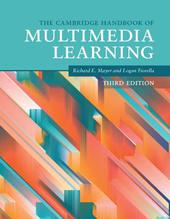
|
The Cambridge Handbook of Multimedia Learning
Paperback / softback
Main Details
| Title |
The Cambridge Handbook of Multimedia Learning
|
| Authors and Contributors |
Edited by Richard E. Mayer
|
|
Edited by Logan Fiorella
|
| Series | Cambridge Handbooks in Psychology |
|---|
| Physical Properties |
| Format:Paperback / softback | | Pages:628 | | Dimensions(mm): Height 279,Width 215 |
|
| ISBN/Barcode |
9781108814669
|
| Classifications | Dewey:371.334 |
|---|
| Audience | | Professional & Vocational | |
|---|
| Edition |
3rd Revised edition
|
| Illustrations |
Worked examples or Exercises
|
|
Publishing Details |
| Publisher |
Cambridge University Press
|
| Imprint |
Cambridge University Press
|
| Publication Date |
9 December 2021 |
| Publication Country |
United Kingdom
|
Description
Digital and online learning is more prevalent than ever, making multimedia learning a primary objective for many instructors. The Cambridge Handbook of Multimedia Learning examines cutting-edge research to guide creative teaching methods in online classrooms and training. Recognized as the field's major reference work, this research-based handbook helps define and shape this area of study. This third edition provides the latest progress report from the world's leading multimedia researchers, with forty-six chapters on how to help people learn from words and pictures, particularly in computer-based environments. The chapters demonstrate what works best and establishes optimized practices. It systematically examines well-researched principles of effective multimedia instruction and pinpoints exactly why certain practices succeed by isolating the boundary conditions. The volume is founded upon research findings in learning theory, giving it an informed perspective in explaining precisely how effective teaching practices achieve their goals or fail to engage.
Author Biography
Richard E. Mayer is Distinguished Professor of Psychological and Brain Sciences at the University of California, Santa Barbara, USA. He served as President of Division 15 (Educational Psychology) of the American Psychological Association and Vice President of the American Educational Research Association for Division C (Learning and Instruction). Logan Fiorella is Associate Professor of Educational Psychology at the University of Georgia, USA. He is a National Academy of Education/Spencer postdoctoral fellow and a fellow of the Psychonomic Society. He has also served as PI or Co-PI on grants from the National Science Foundation, the Institute of Education Sciences, and the Spencer Foundation.
Reviews'Multimedia is a core foundation of digital learning in the twenty-first century. Developers of learning environments need to make dozens of decisions on what media to use and how they are integrated with content and pedagogy. This Handbook covers the systematic research and science-based principles to guide these decisions.' Art Graesser, Distinguished University Professor of Interdisciplinary Research, University of Memphis, USA 'This third edition is a treasure trove of the latest research and insights on how students learn from multiple types of sources, including text, images, games, artificial agents, animations, or virtual reality. Mayer and Fiorella provide the perfect resource to discover or rediscover today's literature on learning.' Danielle McNamara, Director of the Science of Learning and Educational Technology (SoLET) Laboratory, Arizona State University, USA 'Mayer and Fiorella provide an authoritative guide to best practices in designing multimedia learning. Learning of this kind is central to modern education and has been evolving at a rapid pace. Researchers, educators, and curriculum developers will all benefit from reading this valuable Handbook in the updated third edition.' Nora S. Newcombe, Laura H. Carnell Professor of Psychology, Temple University, USA 'This Handbook provides an excellent analysis and synthesis of the important research on multimedia learning. The editors have done a marvelous job of bringing together virtually everything a researcher, teacher, or student needs to know about learning using multiple media. I recommend the Handbook most highly.' Robert J. Sternberg, Professor of Human Development, Cornell University, USA
|